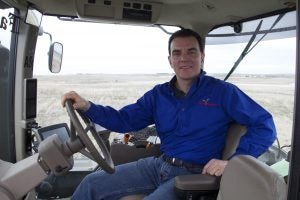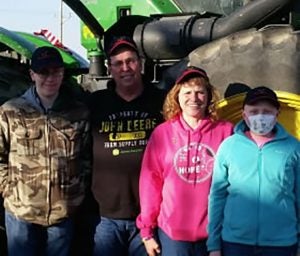By day, Bill Gross, the founder and CEO of Farm Rescue, is a pilot for UPS Airlines and frequently flies all over the world, most recently to China by way of Alaska. Despite his worldly travels, it’s the farm country where his heart lies.
Gross grew up in Cleveland, North Dakota, one of five children, none of whom were able to remain on the farm in the wake of the hardships that befell many farms and ranches in the 1980s. Rather than remain on the financially strained farm of his youth, Gross pursued another avenue.
During the years during which Gross was engaged in pilot training, his parents were forced to sell much of their land and a number of cattle to meet their financial obligations. As he entered a career flying commercially, the pull of the farm remained.
“My heart never left the farming community,” he said. “Even when I would fly over at 35,000 feet over Colorado, Nebraska, or my own state of North Dakota, I would look down at those farms on a clear day and wonder how they were doing. My mind always drifted back to the farm.”

His original idea was to spend his retirement driving a tractor and planter down the rural roads in his home state and pulling into random farms to assist them with their planting, he would be as he said, “a random good Samaritan.” After much thought and an important discussion with a pastor friend, who urged him not to delay his dream and to reach out to farmers and ranchers who have suffered injury or illness, Farm Rescue was born.
“What other nonprofits out there come to the rescue of hard working farmers and ranchers when unexpected crisis hits them through no fault of their own?” he asked himself. Farm Rescue comes to the aid of those farm and ranch families to ease the burden on them and also on the neighbors who are helping as well.
In 2005, Gross filed the paperwork for the nonprofit and began securing sponsorship in the form of equipment dealerships, including RDO Equipment, one of the nation’s largest John Deere, Vermeer, and Topcon dealerships that also operates abroad. The following year, Farm Rescue began taking applications from farmers and ranchers needing assistance.
The first farm family Farm Rescue helped was a 32-year old farmer from western North Dakota who was married with two young children and who had lost his hand in a grain auger accident. Now, 12 years later, over 400 farm families have been served, and the nonprofit has grown to serve North Dakota, South Dakota, Minnesota, Iowa, Montana, and Nebraska.
“We’re up to helping about 60 families per year,” he said. “Anyone who knows farming and ranching knows what a huge job that is.”
Gross explained that Farm Rescue concentrates on operating under pure motivations and isn’t merely a hand out. It is, as he said, a grassroots operation to help a farm family through a season by either planting a crop, harvesting a crop, or putting up hay. It is a boots on the ground concept powered by volunteers and donations. There is little doubt the benefit to the farmer but another benefit, especially close to Gross’ heart is the benefit to the children.
“It helps the children, the next generations, continue,” he said. “If the injury or illness results in a loss of income or taking on more debt, it is a bigger burden on the family and makes it harder for their children to move forward in the operation.”
Helping family farmers translates to maintaining the vibrancy and survival of rural communities. This isn’t done, Gross said, by handing out money but through mobilizing volunteers and equipment and getting the work done.

Among the most recently served families in the Alan Klain family. Klain’s 12-year-old daughter, Amy, was fighting AML Leukemia. According to Carol Wielenga, Operations Director for Farm Rescue, Amy’s treatments were 30 days long and the family had to travel to Fargo, 230 miles from their home, for the duration of each treatment. In their application, Alan and his wife committed to being at their daughter’s side for all of her treatments, leaving the day to day operations of their Turtle Lake, North Dakota, farm complicated.
The Farm Rescue team seeded nearly 1,000 acres for the Klains in the spring of 2016. Amy, now cancer-free, told attendees at a Farm Rescue banquet, “Thank you for helping my dad so I didn’t have to be alone in the hospital.”
Much of the success of Farm Rescue is due to the board members and volunteers. The board members, all of whom have farm and ranch backgrounds, include Vice President Kyle Nelson, Treasurer Jed Wall, Secretary Shawn Sipma, and Director Reuben Liechty. Volunteers have come from all parts of the country and have differing backgrounds in and out of agriculture.
More information including a full list of sponsors and the ways through which you can volunteer or donate can be accessed at www.farmrescue.org and on their Facebook page.



